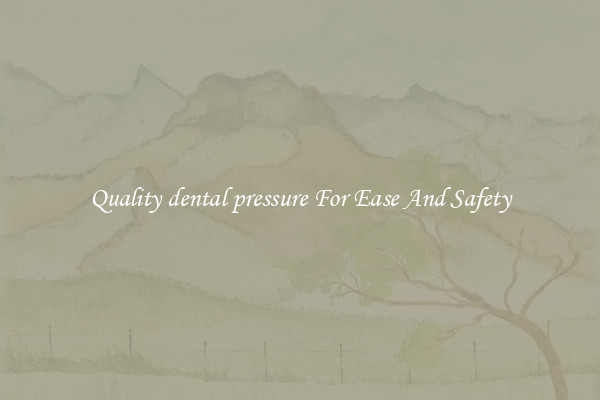Quality dental pressure For Ease And Safety
Quality Dental Pressure for Ease and Safety

When it comes to dental procedures, one of the key factors that both dentists and patients consider is the level of pressure applied during treatment. The right level of pressure is essential for ensuring ease and safety throughout the procedure. From routine cleanings to more complex treatments, maintaining quality dental pressure is crucial for successful outcomes and patient satisfaction.
First and foremost, maintaining the appropriate level of pressure ensures ease for both the dentist and the patient. Dental procedures, especially those involving tools such as scalpels, drills, or lasers, require a level of precision that can only be achieved with the right amount of pressure. Applying too much pressure can cause discomfort and pain for the patient, while too little pressure can result in an incomplete or ineffective treatment. Finding the perfect balance not only ensures a comfortable experience but also allows the dentist to perform the procedure accurately and efficiently.
Additionally, quality dental pressure is crucial for patient safety. Different dental procedures require different levels of pressure, depending on the specific treatment goals and the patient's individual needs. For instance, a simple teeth cleaning may require a gentle amount of pressure to remove plaque and tartar effectively. On the other hand, more complex procedures like dental implants or root canals may necessitate slightly higher pressure to achieve the desired outcomes. By maintaining the appropriate pressure, dentists can minimize the risk of complications, such as excessive bleeding or tissue damage, and ensure the overall safety of the patient.
Modern advancements in dental technology have further improved the ability to maintain quality dental pressure. Dentists now have access to innovative tools and instruments that help them regulate pressure more accurately and precisely. For example, air-driven dental tools provide dentists with greater control over pressure levels, allowing for a more comfortable and efficient treatment process. These tools often come equipped with features like pressure sensors, which alert the dentist if they are applying too much or too little pressure, ensuring a safe and effective procedure.
In conclusion, maintaining quality dental pressure is essential for ease and safety during dental treatments. By finding the perfect balance of pressure, dentists can ensure a comfortable experience for the patient while performing procedures accurately and efficiently. Furthermore, maintaining the appropriate pressure level minimizes the risk of complications and enhances patient safety. With the aid of cutting-edge dental technology, dentists can accurately and precisely regulate pressure, further improving the overall quality of dental care.

View details

View details

View details

View details








